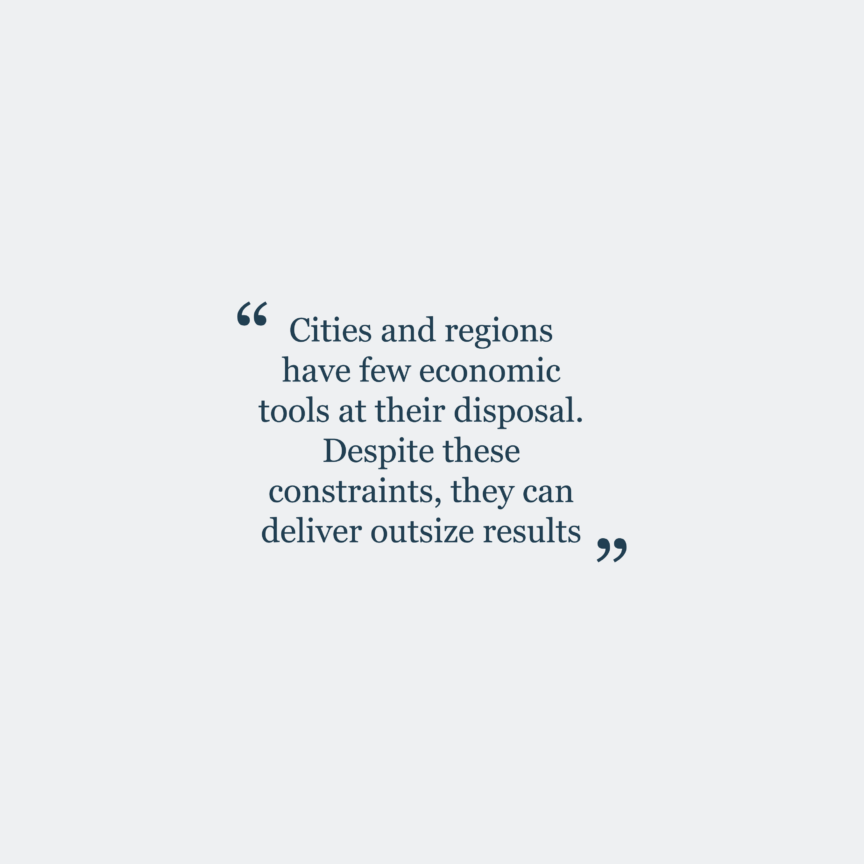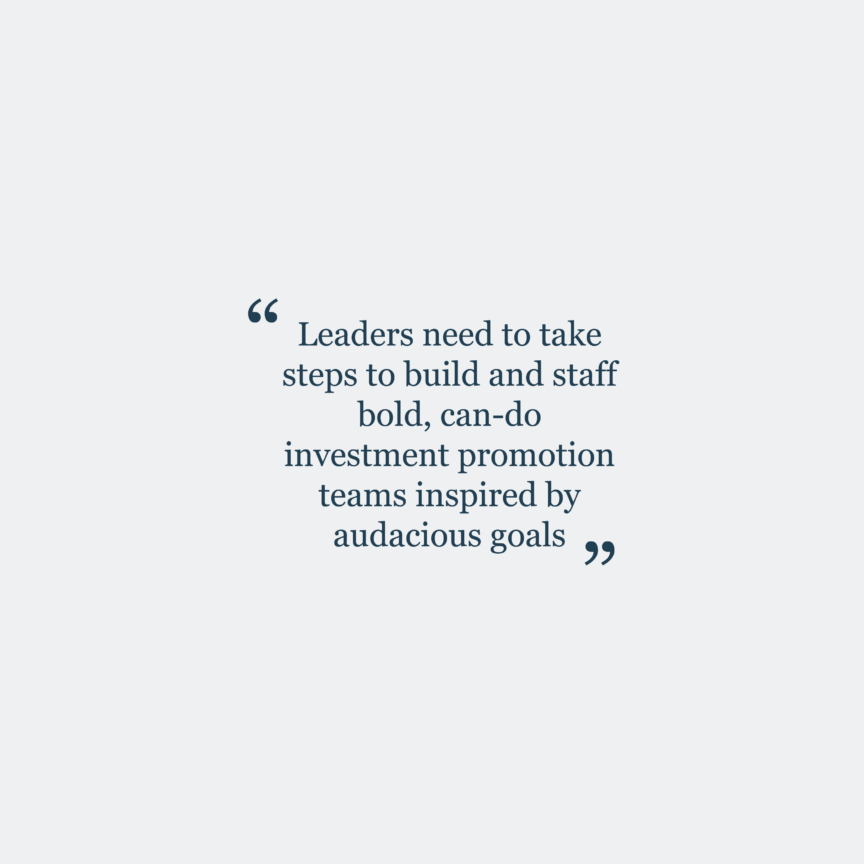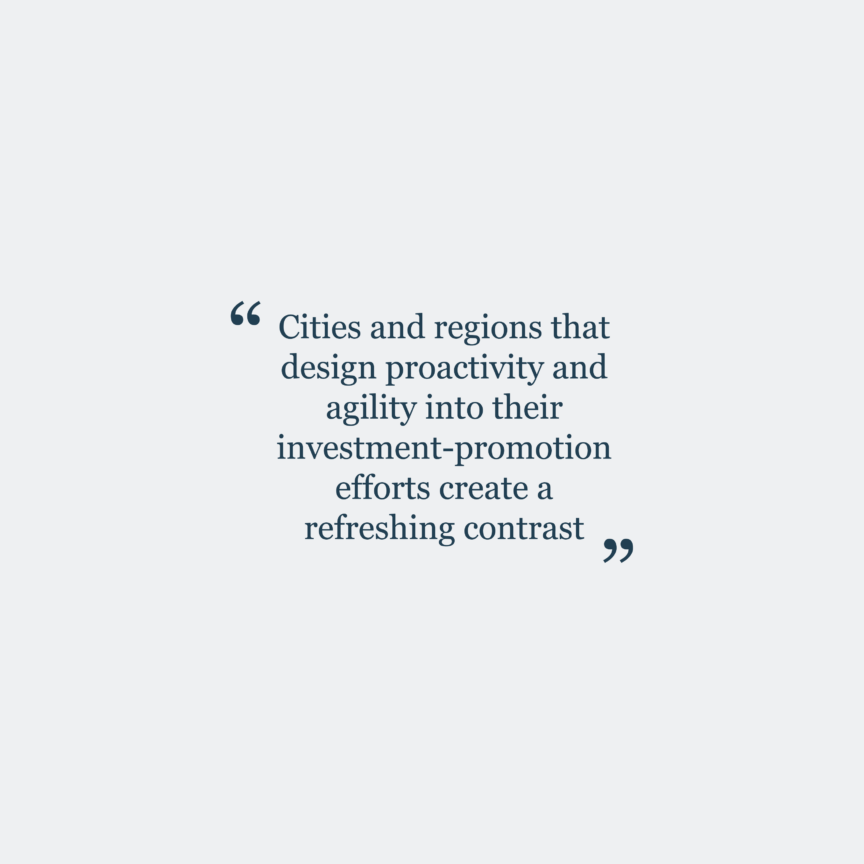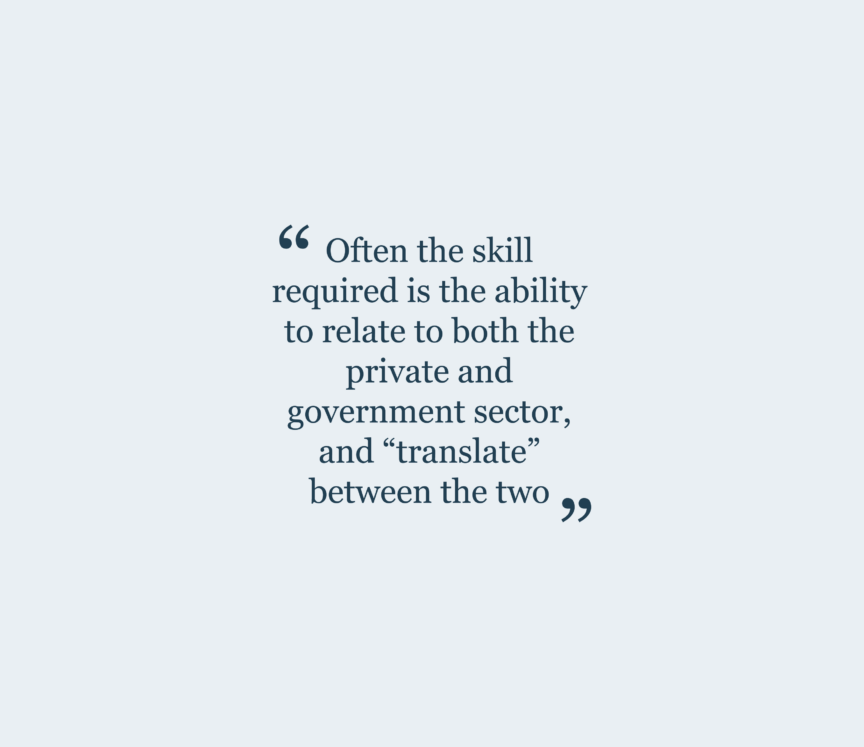Punching above their weight:
How cities and regions can unlock bold new investment
By Piers Thompson and Tim Harris

Unlocking global investment opportunities
Take a stroll through the streets of Birmingham, England’s second-largest city, and its recent economic transformation is clear. New Street, the city’s main thoroughfare, is lined with trendy restaurants and cafes. Huge new office blocks house PwC, Goldman Sachs, Cazenove Capital and UK Treasury – illustrating how Birmingham’s financial and services sector is drawing in investment which would have previously only ever have gone to London. More such developments are on the way.
Just a decade ago, Birmingham was recovering from the global financial crisis and facing high levels of unemployment. Its traditional industries, manufacturing and engineering, had been in decline for years. Its transport links were outdated, and it lacked modern office space. Birmingham struggled to attract financial investment – and it wasn’t drawing talented people, either.
That all changed after Andy Street’s election in 2017 as Mayor of the West Midlands region, which encompasses Birmingham. He transformed the small tourism development agency, Marketing Birmingham, into an influential investment-promotion and development agency, the West Midlands Growth Company.
Since then, Birmingham has hosted the Commonwealth Games – and the Growth Company has used them to put the city on the map. Inward investment flows have overtaken those of more fashionable Manchester, with its iconic football clubs. Birmingham’s investment-promotion efforts have complemented infrastructure improvements such as the opening of Grand Central Station, a major transportation hub that makes it easier for businesses and tourists alike to access the city.

Compared to national governments, cities and regions like Birmingham and the West Midlands have fewer economic tools at their disposal as they typically have no control over tax rates, sectoral legislation, or trade policy. Despite these constraints, city or regional leaders can deliver outsize results if they design investment-promotion agencies strategically, staff them with the right talent, and empower them to go after investment proactively.In Consulum’s experience of working with multiple city and regional leaders, we have seen that only 10 to 20 percent of investment results from inbound enquiries; the lion’s share comes from proactive outreach to potential investors.
The prize is big. Global flows of foreign direct investment (FDI) recovered to pre-pandemic levels to reach $1.6 trillion in 2022 – an increase of 64 percent from 2020.[1] In developing countries, FDI related to achieving the Sustainable Development Goals grew even faster, by 70 per cent over the same period. But competition for this investment is fierce – and getting fiercer in a world characterised by economic turbulence and geopolitical conflict.
How can a mayor or regional leader unlock this investment? As we argue in this article, they need to take steps to build and staff bold, can-do investment-promotion teams inspired by audacious goals.
There are three steps – increasing in complexity and reward size – that leaders of cities and regions can take to seize the opportunity and compete successfully for game-changing investment. Each step masters greater complexity in relating externally – from responsiveness, to translating between private and public sectors, to relating and convening at a systems-level across the entire ecosystem of economic development.

1. Be the one percent: design for proactivity
For multinational companies and other investors seeking to expand into new geographies, the common experience in dealing with government agencies is frustration at bureaucratic unresponsiveness – and the inordinate amount of time it takes to get anything done. Cities and regions that design proactivity and agility into their investment-promotion efforts create a refreshing contrast. “If you simply respond to potential investors, you are already in the one percent,” says a former head of a successful investment-promotion team.
Achieving such proactivity starts with inspiring staff to believe passionately in the mission of improving the economic fortunes of their city or region and encouraging them to surmount any hurdle to win the hearts and minds of global investors. These staff should be outward facing and have goals that incentivize relationship-building with investors.
Proactivity is about the personal, too – recognising that companies are made up of humans. In one case we were involved in, a global technology company was weighing up a few cities for its next major investment. What clinched its decision to open up shop in an emerging-markets city was the personal service provided by the local investment-promotion team. This included helping a key executive to find a house that suited his family, and to get his children into the best local schools. The result was millions of dollars of new investment for the city.
Proactivity of this kind builds relationship “muscle” in investment-promotion agencies. A team that is switched on unlocking investment from known investors can prove to be similarly receptive and responsive when a hitherto unknown investor comes knocking on the door. Proactivity also confers a first-mover advantage that allows a city or region to avoid the competitive race to the bottom of offering financial incentives they can ill-afford.

2. Hire skills that bridge the gap
Harvard economist Ricardo Hausmann asserts that economic growth and development is driven fundamentally by capabilities.[2] We agree. Hiring people with the right skills must be at the centre of any growth agenda for a region or city. This requires regional leaders to assess their own skills, hire to fill any gaps, and leave their team alone to get the job done. Political leaders, accustomed to being advised to “lead from the front”, can find this hard to do. But critically, it avoids decision-making being constrained by the leader’s bandwidth and availability.
Often the skill required is the ability to relate to both the private and government sector, and “translate” between the two. Policymakers, regional administrators, and political leaders do not talk the same language as business leaders, and businesses don’t always understand how officials or political leaders think, or what motivates them. What is good for business is not always good for politics. Businesses don’t have votes, while citizens do, so the political lens focuses on delivering for citizens.
“Many investment-promotion agencies talk in adjectives to describe possibilities and pitch the destination,” says a former head of a successful investment-promotion team. “But businesses talk in numbers – they make data-driven decisions.” A case in point is Amazon’s investments in Cape Town, South Africa. The company had already established a hub for Amazon Web Services, drawing on the city’s abundant tech talent – but it needed further convincing to expand its operations. Cape Town’s investment-promotion agency, WESGRO, arranged extensive data-driven sessions led by regional political leaders and technical experts, on issues ranging from crime statistics to water availability. That unlocked tens of millions of dollars in additional investment by Amazon, including the development of major data centres and a new African regional headquarters.

Some of the most successful heads of investment-promotion teams have been hired by city and regional leaders from the private sector. One example is Andrea Zopp, the president and CEO of World Business Chicago (WBC), who had significant private sector experience prior to joining WBC, including in banking, consumer products, and retail sectors. Another is María Isabella Muñoz, Executive Director of Invest in Bogotá, who was previously a partner in a private equity fund manager.
WBC is a public-private partnership that promotes economic development and job creation in Chicago. Zopp’s private-sector experience meant that she understood the importance of creating a supportive business climate and developed policies and initiatives attractive to businesses, including streamlining regulatory processes, and investing in infrastructure and workforce development programs.
Invest in Bogotá receives funding and support from the public sector, as well as access to key government resources and networks, including assistance with legal and regulatory requirements, and permits and licenses. But the magic happens in the combination with the private sector, which provides Invest in Bogotá with industry-specific knowledge, market insights, and access to investment opportunities. All companies registered in Bogotá pay a fee to the Bogotá Chamber of Commerce, which funds Invest in Bogotá. A leader like Muñoz – with her extensive private sector experience – can make sure that businesses feel they are getting value for their fees.

3. Convening: the investment-attraction superpower
A potential superpower of city and regional investment-promotion teams is that they can be a more natural convenor than national governments. Next-level investment-promotion agencies have an ability to spur symbiotic outcomes between different organisations in a region doing different things. Investment-promotion teams may lack tax-raising or tax-spending power, but they do have convening power – which can be a remarkably strong force to drive regional economic development. Investment-promotion teams can align local decision-makers on skills, transport, real estate, and university research with sector trends, investment movements, and business needs.
This kind of higher-order economic development comes from an ability to instil trust and get institutions from different sectors to collaborate. For example, an investment-promotion team that supports regional universities to bring in international students effectively creates an export product for that region. Further, university students have parents, and wealthy parents may choose to invest in an area or country with which they become familiar, and they may also support university fund-raising drives. More strategically, an investment-promotion team can help regional education initiatives align with investment requirements. For example, in Cape Town, WESGRO worked closely with a local university and IT skills academies to drive the provision of training for Amazon Web Services certifications – hitherto in scarce supply in South Africa.

Transcending silos demands of a city or regional leader that they assess all opportunities that promote their city or region, even where those promotional activities sit outside of their institution – such as tourism agencies. Tourism agencies can be a good source of talent, too. For example, the CEO of Marketing Birmingham, Neil Rami, was tapped by Andy Street to run the West Midlands Growth Company. Accustomed to promoting the region for tourism, he could readily turn his skills to promote the region for business and investment, too.
Another example of a city leader who could transcend institutional silos is Rahm Emanuel, who served as the Mayor of Chicago from 2011 to 2019. Together with World Business Chicago, and CEO Andrea Zopp, Emanuel started a program called Chicago Anchors for a Strong Economy (CASE), which connected local businesses with large anchor institutions, such as hospitals and universities, to create more opportunities for small and diverse businesses.
A visionary and successful mayor or regional leader, together with their investment-promotion team, can beat the odds and unlock game-changing investment. To be sure, it is a complex task, and it requires unexpected set of skills, and bold choices. But there are examples from around the globe of how a creative, vision-driven city or regional leader can put a city or a region on the map, attract investment and talent, and drive economic development and job creation, for legacy-making impact for their citizens that reaches far into the future.

About the authors
Piers Thompson is a senior director in Consulum’s Competitiveness practice, and advises on foreign direct investment, capacity building, economic development strategy, and policy. Piers has advised multiple international governments and regulatory agencies on economic development, infrastructure investment and investor relations, as well as advised governments, institutional investors and Fortune 500 corporates on foreign direct investment, in the UK, Australia, Canada, China, Japan, India, Italy, Germany and other jurisdictions around the world.
Tim Harris leads the Competitiveness practice and the Cape Town office of Consulum. A former Member of Parliament in South Africa, he previously served as CEO of Wesgro, the Tourism, Trade & Investment Promotion agency for Cape Town and the Western Cape in South Africa, where he initiated the Cape Town Air Access route-development programme.
References
[1] UNCTAD (2022). World Investment Report 2022. [online] World Investment Report. Available at: https://worldinvestmentreport.unctad.org/world-investment-report-2022/
[2] Hausmann, R. (2020) ‘The missing link in economic development?’, Project Syndicate, 29 December. Available at: https://www.project–syndicate.org/commentary/capabilities–as–a–key–ingredient–in–growth–and–development–by–ricardo–hausmann–2020–12
